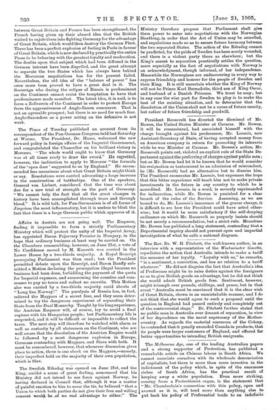President Roosevelt has directed the dismissal of Mr. Bowen, the
United States Minister at Caracas. Mr. Bowen, it will be remembered, had associated himself with the charge brought against his predecessor, Mr. Loomis, now Assistant-Secretary of State, of having accepted money from an American company in return for promoting its interests while he was Minister at Caracas. Mr. Bowen's action, Mr. Roosevelt points out, violated an explicit rule of the State De- partment against the preferring of charges against public men; but as Mr. Bowen had let it be known that he would consider his resignation as tantamount to an admission of misconduct, he (Mr. Roosevelt) had no alternative but to dismiss him. The President exonerates Mr. Loomis, but expresses the hope that this bitter experience will teach him not to make private investments in the future in any country to which be is accredited. Mr. Loomis, in a word, is severely reprimanded for indiscretion, while Mr. Bowen is punished for a clear breach of the rules of the Service. Assuming, as we are bound to do, Mr. Loomis's innocence of the graver charge, it is difficult to see how the President could have acted other- wise ; but it would be more satisfactory if the self-denying ordinance on which Mr. Roosevelt so properly insists should be not merely a recommendation, but a strict rule. Meantime Mr. Bowen has published a long statement, contending that a Departmental inquiry should not prevent open and impartial investigation of what he calls a national disgrace.


















































 Previous page
Previous page